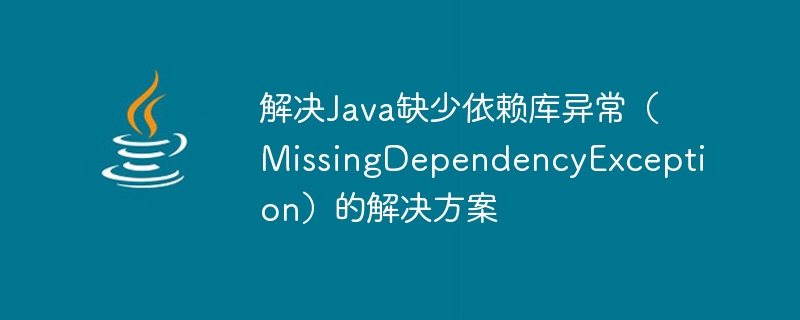

Solution to solve Java missing dependency exception (MissingDependencyException)
During the Java development process, we often encounter exceptions of missing dependency libraries. This kind of exception usually occurs when the program is running, causing it to fail to execute normally. To solve this problem, we need to find the missing dependent library and add it to the project. This article will introduce some common methods to solve the problem of missing dependent libraries in Java and provide corresponding code examples.
The methods to solve the Java missing dependent library exception mainly include the following:
Manually adding dependent libraries is the most direct method. You can download the required dependent libraries from the official website or the third-party library's repository and add them to the project's classpath. In an integrated development environment such as Eclipse or IntelliJ, you can right-click the project, select "Build Path" or "Add to Library", and then add the dependent library to the project.
The following is a sample code that demonstrates the process of adding a third-party library:
import com.example.library.ExampleClass; public class Main { public static void main(String[] args) { ExampleClass example = new ExampleClass(); example.doSomething(); } }
Use build tools such as Maven Or Gradle can more conveniently manage the project's dependent libraries. By adding dependencies in the project's configuration file, the build tool automatically handles the downloading and installation of dependent libraries. You only need to specify the names and versions of the required dependent libraries in the configuration file.
Taking Maven as an example, the following is a sample pom.xml file that demonstrates how to add dependent libraries:
com.example myproject 1.0 com.example.library library 1.0.0
When you use the build tool to build a project, it will automatically download and install all required dependent libraries.
If you are using a Java EE container such as Tomcat or Spring container, they usually come with a built-in dependency library management system. Just add the required dependent libraries to the container's classpath and the container will automatically load them. For specific operation methods, please refer to the documentation of the container used.
The following is a sample code that demonstrates how to use dependent libraries in a Spring Boot application:
import org.springframework.boot.SpringApplication; import org.springframework.boot.autoconfigure.SpringBootApplication; @SpringBootApplication public class MyApplication { public static void main(String[] args) { SpringApplication.run(MyApplication.class, args); } }
In the above example, Spring Boot will automatically load the required dependent libraries.
In summary, the methods to solve the Java missing dependency library exception include manually adding dependency libraries, using build tools to manage dependencies, and using containers to manage dependencies. Which method you choose depends on your specific needs and environment. Regardless of which approach you take, you need to ensure that the required dependencies are configured correctly and added to the project. This ensures that the program can execute normally.
I hope the solutions provided in this article can help you solve the problem of missing dependent libraries in Java. Good luck with your programming!
The above is the detailed content of Solution to Java missing dependency library exception (MissingDependencyException). For more information, please follow other related articles on the PHP Chinese website!
